Interview by Lucilla Gentile
I meet Andrea Camerini, vocalist and lyrics writer of the band Nuove Tribu’ Zulu, during a short break from their rehearsals: they are very busy preparing their next live performance in Rome, scheduled for January 9th, 2016 at the Auditorium Santa Chiara (EUR-Torrino) within the second edition of the Festival Mediterraneo dell’Incontro, organized by Associazione Culturale Etnochoreia.
Hi Andrea: your band has a long and very interesting story. Let’s start from the very beginning, when you guys played a peculiar kind of music. Could you tell us what was it like to live and play in Rome in the Eighties?
We started playing music mostly under the influence of music coming from the UK. In the Eighties there were very few people who made music in Rome and music schools only knew classical stuff or jazz. The “alternative” musical scene in Rome was very lively, but we were really a small bunch of people: however, there were lots of concerts and things going on. We felt as everything had yet to be built.
It was a very particular moment, because our generation didn’t have the chance to acquire the social inheritance of the Seventies. Our political system managed to create something like a blanket of fog on the Italian society after the years of terrorism – a period that Italians often remember as “The Years of Lead”, Anni di Piombo.
Thus, the Eighties were a season of hedonism and consumerism, heavily influenced by American Reaganism – that gradually led us towards the phenomenon of “Berlusconism”. Mass media started to lay down the law about everything, often manipulating the truth. Nowadays we can clearly see the results of that strategy.
We started our first band with an impressive name: The Cyclone. We played in a very fast rock’n’roll style, with a strong punk and garage influence. That particular genre was known as psychobilly and London was the heartland of that phenomenon. I often went there and always came back with tons of vinyls: back then it was very difficult to find that kind of music in Italy.
My brother Paolo played the Double Bass in the band with some of his schoolmates from the Artistic High School in Via Ripetta. Between them there was Roberto Berini, the drummer, who shared with us many years “on the road”. It was a gorgeous start: just after the release of our first album we started touring around Europe: we played in Paris, Amsterdam and then London.
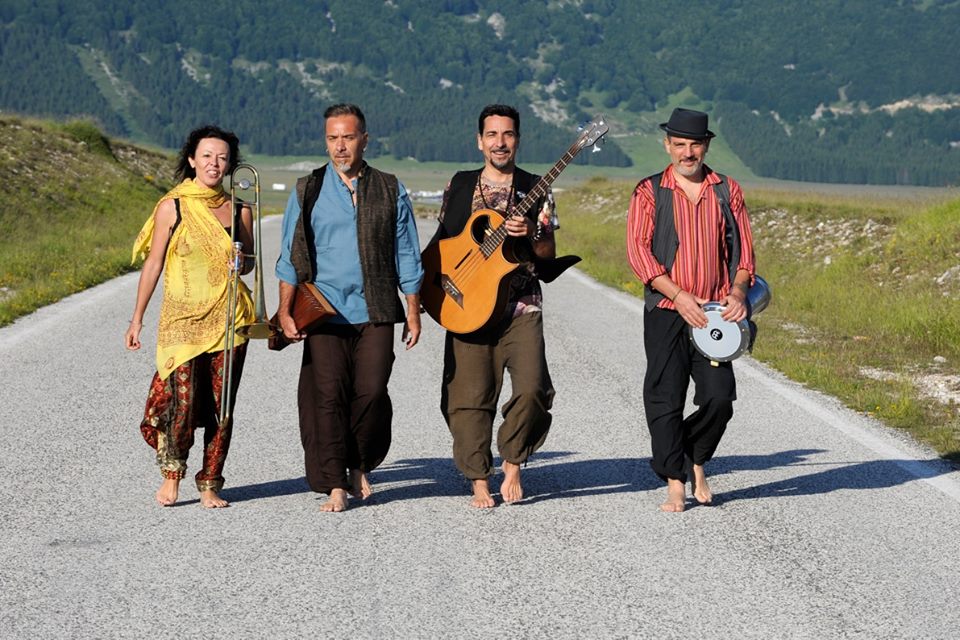
How did the Nuove Tribù Zulu chapter of the story start – and what was the audience’s feedback to this change?
Nuove Tribù Zulu started in 1991: at that point of our story we felt the urge to go beyond the usual places like music clubs, etc. Moreover, we wanted to protest against the lack of suitable structures for music in our country. Italian alternative music has always managed to survive thanks to the efforts of many courageous people all around the country. It takes courage indeed to offer different genres of music when the whole “official” music scene is hegemonized by TV Shows and events like the Festival di Sanremo.
Thus, we decided to bring our music on the road and we started playing in Campo De’ Fiori, under Giordano Bruno’s statue, with the purpose to get in touch with as many people as possible. And this happened.
Those were the days in which the first Gulf War started. It was the beginning of the disaster we are seeing today. We felt very angry about that and playing on the road was a kind of therapy.
The Road was a good Life Teacher to us. Playing for people of all ages and cultures was an unforgettable experience and we grew up a lot. We realized that acoustic sounds from our Mediterranean tradition could be mixed with rock, punk and gypsy music: the result had a great impact as we saw in other bands that we liked a lot, like Mano Negra and Les Négresses Vertes.
Soon after that, there were the fabulous years at Il Locale, legendary music venue in the very center of Rome, Vicolo del Fico. We started playing also in Festivals, Theatre Shows and at the Italian TV, RaiTre.

Your repertoire is incredibly rich and contains different “souls”: a very danceable one with a great energy, along with a remarkable virtuosity. Another one is more intimistic and meditative.
Recently, due to your collaboration with Nomadic Musicians from Rajasthan, we have seen another soul coming out, a more “ethnic” one, with new compositions often built on a drone or very few chords. Which are the songs that you absolutely prefer and could never leave out from a concert?
As you can imagine, some of our songs have been travelling with us for years, changing and growing up with us.
Zingara, for example, was the big hit of our first album Sulla Strada (2000). This song is very important for us as it is deeply connected to the years I spent as a social worker with my brother Paolo. We worked with the Gypsy Khorakhané Community in Vicolo Savini and from that experience we learned a lot, discovering new horizons.
No wonder we decided to travel to India all together in 1998: it was a very important journey for us.
Other songs that I keep in my heart are Da Domani Cambio Vita, chosen by the film director Ivano De Matteo as the final track for his film Gli Equilibristi (2012) with Valerio Mastandrea, and Il Dio dentro, a very intense song that brings me back to the unforgettable years spent with the whole band at the Centro Età dell’Acquario Monteluce, in Umbria.
Last but not least, Damu Damu Dindindara, the very first song we composed during our stay in the Rajasthan countryside, Northern India, with the fantastic musician and storyteller Suraji, who also played a wonderful string instrument, the Ravanatha.
Andrea, you’ve been living in India for five years and you came back to live in Rome last spring. What was it like to be back in Rome after such a long experience in a very different country?
Back in 2010, I made the choice to live in India for several reasons. First of all, I believed that the future was in the encounter between East and West, which I think is now happening in some ways.
Coming back to Rome after such a long time in Southern India (I lived in Pondicherry) hasn’t been that easy. In India everything is totally different: your body gets gradually used to tropical climate, different foods, local culture and mindset. And it takes time to elaborate all these aspects if you want to live that kind of experience at full.
Living in India has a meaning if you have a strong motivation. Music, as usual, has been of great help: studying Carnatic as a singer has been very important for a deeper understanding of the soul of this incredible land. India always gives you unique experiences, either in good or in bad ways.
Definitely, living in India has given me a different strength and a new way to look at my hometown on a symbolic and mythological point of view. There is a quote from a book by Professor Armando Gnisci Noi altri Europei that I’d like to remember here: he writes about Rome and her secret name “Amor” (Love), but above all he analyzes the fact that the Spirit of the city keeps living also in her ruins, which are part of her social life and urban fabric.
Rome is always Rome, but as goes a popular saying, “There are countless doors to get into India, but there’s no door to get out of it”.
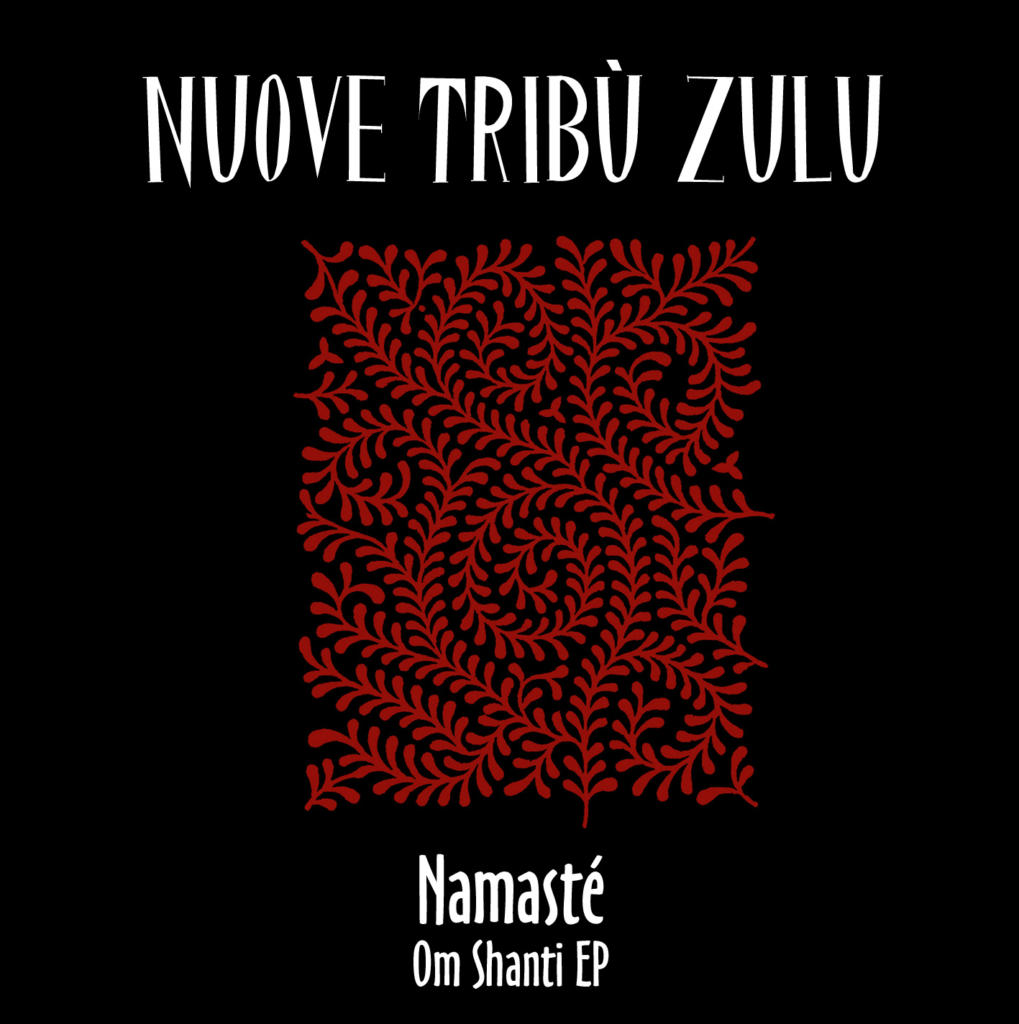
You will present your new EP “Namasté” on the stage of the Auditorium Santa Chiara: can you tell us something about this work?
The EP contains two new songs: Namastè and Hara Shiva Shankara, featuring two great musicians: the setar player Pejman Tadayon from Iran and Sanjay Kansa Banik from Calcutta at the Indian tabla.
Both songs are built on powerful drum and bass grooves, which makes them perfect for dancing. We made this choice after the experience with the Indian musicians: dancing is very often deeply connected with folk music. This is also why we decided to create a Remix for each song: the musician and DJ NeroloZ (Lorenzo Gentile) realized them for us.
We composed the songs with the aim to create a kind of circular energy. While Hara Shiva Shankara comes from a Bhajan (traditional devotional chant) dedicated to Shiva, Namastè merges Eastern and Indian sounds with a rhythmic vocal progression very similar to that of the Italian “taranta”. The EP is being released by Fabio Lauteri‘s Label Filibusta Records.
Let’s talk about the Festival Mediterraneo dell’Incontro: a very interesting project which is now at its second edition. The first concert, last Novembre 28th, saw the Piccola Banda Ikona on stage, and next December 19th there’ll be a double concert by the bands Migala and Algeciras Flamenco.
These musical genres are very successful in Europe, while in Italy their audience is not so wide. Do you think this situation might change in the future?
In Italy there are many important musical projects that would deserve much more attention. As I said before, it depends on media campaigns and your own power of promoting yourself. In this case, it is thanks to the initiative of people like Paolo De Pascale and Roberta Parravano from the Associazione Etnochoreia that this Festival was made possible, thus keeping this space open and alive.
The so-called mainstream keeps promoting only extremely commercial projects, and in such a situation it is no wonder that many musicians’ only hope is to get to TV Shows, Talent Shows like X Factor or big events like Sanremo or the Primo Maggio concert.
I find it rather sad: luckily, nowadays social networks are offering new chances to independent artists but it is not easy to distinguish yourself in such a massive musical scene. Lobbies and big companies are already getting the most out of it by sponsoring and buying advertising spaces worldwide.
You have often organized initiatives in which music joined social commitment: music workshops in schools, projects with children in Scampia (Naples), concerts with the Gypsy dancers “Chejà Celen”. What makes you so keen to create these events?
We have always been convinced that music is a fascinating mystery and a wonderful artistic form. It is also a very effective means to transform reality around us. Musical language is universal and can communicate immediately with everyone, it is emotional, ancestral, it can reach the deepest levels of human soul.
That’s why we have always searched for solidarity experiences and we decided to bring music into difficult social contexts. This is also why we often chose to share the stage with the young Gypsy dancers “Chejà Celen”. We meet many children on our road: they represent the future, the change we’d like to see in the world. Through this kind of activities we try to spread little positive seeds for a more enlightened future… Always looking up to the sun.
In such a difficult moment in our history, where identity and religion-based conflicts seem to undermine the idea of a peaceful and fruitful coexistence between different cultures, what is the message you want to spread with your music?
Our present situation is very complex and comes from a long series of mistakes, abuses and prevarications. Human consciousness must necessarily grow, towards the awareness that every single life is important and precious.
After thousands of years of history, there are still wars, slaughters and exploitation, and almost no one cares about the consequences of these crimes: this shows clearly how low is the conscience of those who are in power of taking such decisions. They don’t comprehend the laws of the Universe.
Our message is very clear in our lyrics and sounds: a message of love beyond religions, dogmas, ethnicity, skin color… it comes from very far and is on the wave of the history of men and women who often gave their lives to spread it: we all are One. It is an invitation to the movement and progress of life beyond all fears. The search for the truth within and around us, against every form of power that denies human rights and values.
You guys have been travelling all around Italy with the Caravan tour in 2009 with the Nomadic Musicians of Rajasthan: after that there was a big tour in India. Can you tell us something about these experiences?
Both the Italian and Indian Tours, organized with Laura Di Nitto – who took a very important part in managing and producing our albums since 2003 – have been really exciting.
There was a great energy, though it was quite hard on the logistics standpoint. Imagine travelling around with a group of 20 people or more!
All the people who enjoyed the concerts of Nomadic Orchestra of the World understood first of all the purpose of the project: the idea of building a cultural and spiritual bridge between Italy and India, two countries with millenary traditions, who gave birth to great civilizations – and in the same time the promotion and safeguard of the civil rights of nomadic populations and their cultural heritage. In this field, our collaboration with the Indian organization Chinh India was very important.
Wherever we went, from La Spezia, Trento, Roma e Palermo to New Delhi, Mumbai, Chennai and Auroville, the response of the audience was always full of warmth and appreciation. We succeeded in organizing something that had never happened before, and we still feel very lucky about that.
Soon after the tour it was our great pleasure to receive the prize “Suoni di Confine 2009” from Amnesty International at the MEI Festival in Faenza for the best multicultural integration live show.
Who’s going to be with you guys on stage next January 9th?
Our usual lineup, composed by me on vocals and flute, my brother Paolo Camerini on Electric Bass and Double Bass, Ludovica Valori on Accordion, Trombone and Keyboards, Roberto Berini on Drums and Massimiliano Diotallevi on Saxophone, will be featuring Pejman Tadayon on Setar (a classical instrument from Persia – not to be confounded with the Indian Sitar) Sanjay Kansa Banik on the Tabla (Indian percussions).
Before saying goodbye, could you tell us something about your future projects?
In this moment we are composing songs for a new album that we hope to release very soon.
As for the rest, we are always receptive and ready to new ideas and projects that can lead us to new adventures. In our lifelong journey, lightning intuitions were always the best guide and made us conscious that when you have courage, everything is possible.
Website:
www.nuovetribuzulu.it
Facebook Page:
https://www.facebook.com/Nuove-Tribù-Zulu-61959127120
Videoclip “Verso l’India”:
Videoclip “Damu Damu Dindindara”:
Videoclip “Zingara”:
Videoclip “Da domani cambio vita”:
A lover of art, music and literature – Graduated in DAMS at the University of Roma Tre.

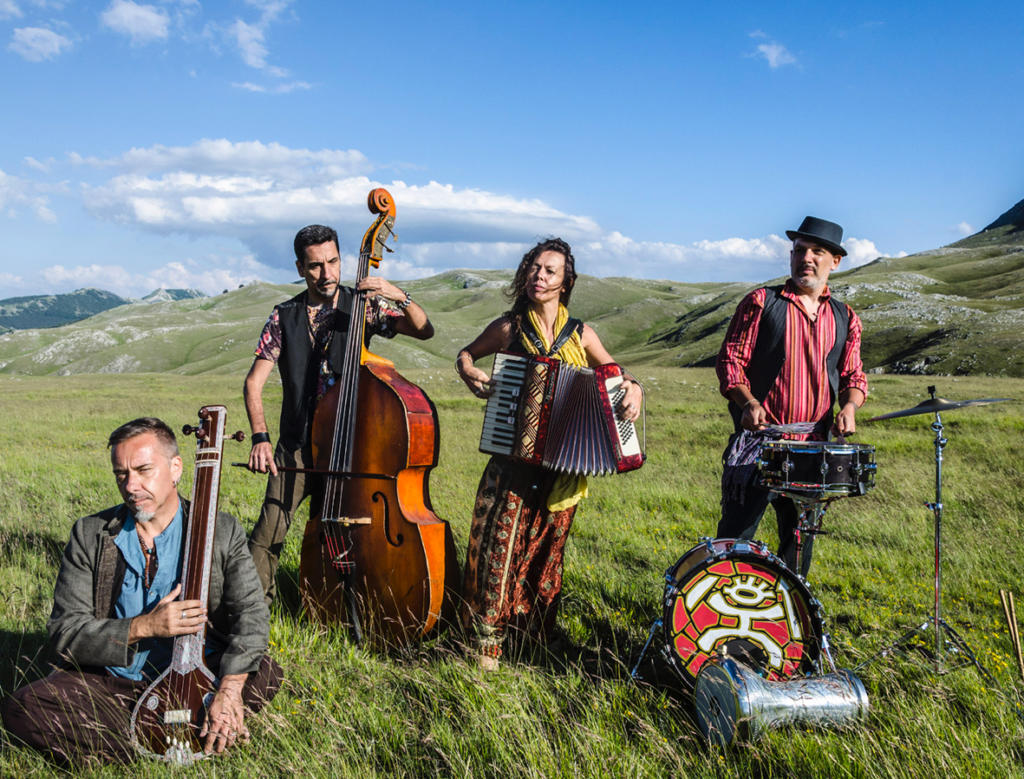
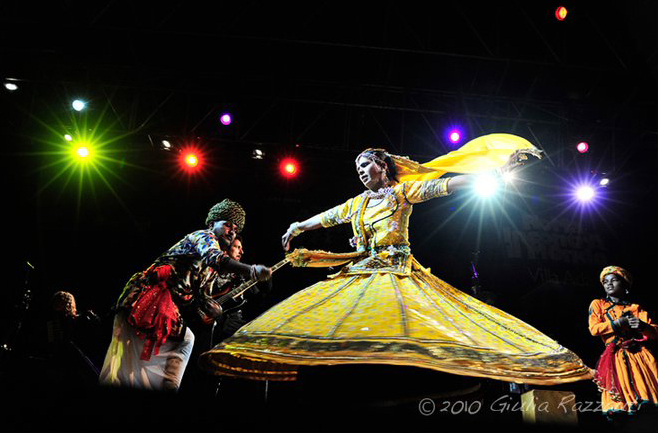
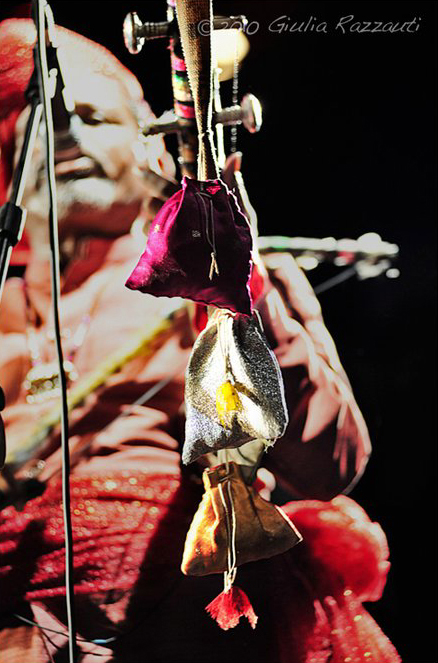
ASPETTANDO IL CONCERTO DI SABATO 9 GENNAIO AL FESTIVAL MEDITERRANEO DELL’INCONTRO ALL’AUDITORIUM SANTA CHIARA… https://t.co/33KdZI8ORW